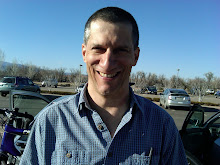I've had this test twice before since both my parents had a history of cardiac problems and my GP is pretty in tune with sports related physiology. We use Boulder Sports Medicine for the test. It's a grueling, exercise to exhaustion test that you do on the bike or running treadmill while your cardiac function is evaluated.
Here's how it works:
- Get hooked up to a 12 lead EKG
- Heart rate and 02 sat monitor on your finger
- blood pressure cuff on your arm
- Lie down for 5 minutes, get a good baseline EKG, heart rate, blood pressure reading
- Warm up on the bike. The bike is hooked up to a laptop that runs a program that drives resistance on the bike and reports back on power output from the bike. Very cool. You can see your mph, cadence, wattage output. Very Chris Carmichael-ish...
- After a few minutes of warm-up (for me, that's doing about 18 mph putting out 100 watts), the hill climb begins...
- For the first four intervals, wattage is increased 25 watts every 2 minutes.
- The first few increases are not very noticeable in terms of difficulty. Still spinning between 95-100 rpm, speed 19-20 mph, as power output goes from 100-200 watts.
- After the first four intervals, the wattage increase goes up 25 watts every minute. In physical terms, it's easiest to think of this as climbing an ever steepening hill keeping your velocity constant. Take your body weight, move it down the road at a certain speed and you'll be generating a certain amount of power to overcome wind, road and gravity resistance. Now, tilt the ramp of the road - to keep the same velocity you have to put more power into the bike.
- The cool thing about the bike is that it has variable resistance that's tied to the required power output. So if you start to be a lazy ass and slow your cadence down, the bike just makes the resistance harder. So there is no escaping the fact that unless you completely give up pedaling, you WILL be generating the amount of power that the program is demanding you generate. So there is no where to hide. Awesome :)
- For me, from 200-300 watts is where the real party happens. Working hard and every minute it just gets HARDER.
- While this is going on, the physiologist is taking blood pressure, heart rate, 02 sat readings and the doctor is watching the EKG for any funkiness.
- Two years ago, I made it 30 seconds through the 375 watt level. Yesterday I popped in the middle of the 325 watt minute but managed to moan and groan (and I do mean actually moaning and groaning) through the end of the 325 watt interval. So in essence, I blew up about 90 seconds earlier than I did two years ago. That feels about right in terms of what I've quantified - I seem to be about 15% off from what I could do when I was healthy in terms of average speed on rides, etc.
- After that, you crawl off the bike, lie down and they watch your EKG and blood pressure as you recover.
I chatted with my doctor about doing the Copper Triangle and he said it was ok to do the tour but that I should wear a heart rate monitor and keep my heart rate < 150. Obviously my body is going through a lot and we want to find a balance point where my exercise helps me manage the chemo but I don't stress myself so much that the exercise regimen itself becomes too burdensome.
So all in all, a good outcome and I've definitely got some increased piece of mind that so far, my core organs seem to be holding up ok throughout this process.
BTW, if you're interested in getting this done to help with your training, I'd highly recommend these guys. I suspect it's a bit pricey if your insurance isn't covering it but it's really interesting information to get about your body, how you train, etc.
As another data point, they tested a local pro bike racer earlier in the day and he popped at the 475 watt interval. So that explains why he races bikes for a living and I write software :)

I think making it to the 325 watt level is super! Good news that you weaseled a way into doing the Copper Triangle as part of your chemotherapy. Sounds like you are continuing to take care of yourself. Always good to hear!
ReplyDeleteLove you!
C
I am glad as i have seen a good outcome and I've definitely got some increased piece of mind that so far, my core organs seem to be holding up ok throughout this process.
ReplyDeleteHeart Screening
Hey, Brian. Yeah, it's nice to know that the core systems are ok while you're getting rocked with chemo or whatever. Since some of these drugs can be quite toxic to major organs, it's no joke to be concerned about keeping your major organs intact. Good luck on the journey and I hope you have a great outcome!
ReplyDelete